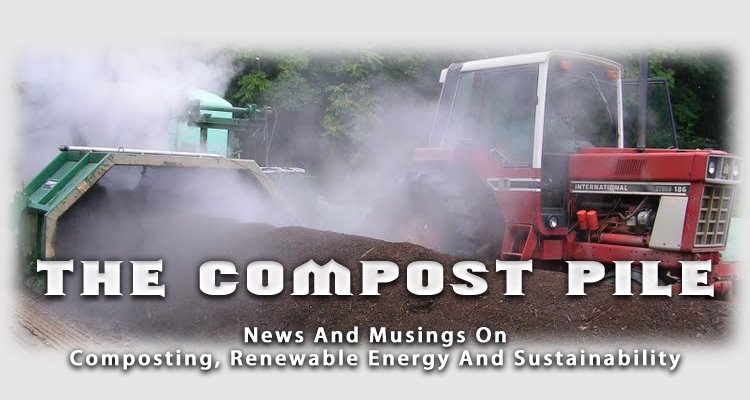skip to main |
skip to sidebar
Do you love compost, and want everybody to know about it? Then check out these new buttons! One of my new projects is RRcraft, where we combine art with environmentalism, with green themes and greeting cards printed on 100% recycled paper with soy inks.
printed on 100% recycled paper with soy inks.
The concept for this button is a family story. When I started writing for BioCycle magazine, my grandmother was very excited. She has long been an avid composter, and recalled a story from many years ago, when she was profoundly critical of the state of affairs in the world (somewhat similar to today). My grandfather asked her, "Well Natalie, do you believe in anything?" She quickly responded, "Yes, I believe in COMPOST!"
My grandmother is still composting, even though space is limited at her retirement home, and she uses a walker to get around.  She has a small balcony, and puts her food scraps in a large planter, using a big kitchen spoon to stir the compost. The spoon is sterling silver, so those food scraps get the royal treatment!
She has a small balcony, and puts her food scraps in a large planter, using a big kitchen spoon to stir the compost. The spoon is sterling silver, so those food scraps get the royal treatment!
Check out all of RRcraft's items at: RRcraft.Etsy.com
While in Italy last September, I attended a Slow Food Cheese event. Slow Food is an international nonprofit that was started in Italy in 1989. It was founded on the ideas of gastronomy, which is the study of the relationship between  culture and food. The nonprofit was established in part to counteract the proliferation of fast food, perceived as a threat to Italian culture.
culture and food. The nonprofit was established in part to counteract the proliferation of fast food, perceived as a threat to Italian culture.
Slow Food has grown significantly since 1989, and now has 1,000 local chapters (called "convivia") in 132 countries, with a total of more than 100,000 members. Events are held all around the world, but the largest festivals are held in Italy. These include the annual Terra Madre (“Mother Earth”), and the biennial events Salone del Gusto (“Hall of Taste”) and Slow Cheese.In 2008, Slow Food launched an initiative to green its events, entering into a multi-year partnership with Novamont, an Italian bioplastics producer. Together, the organizations are working to  progressively reduce the environmental impact of Slow Food events, targeting waste generation, packaging, furnishings, cutlery, logistics for transporting goods, CO2 emissions and energy and water resources.
progressively reduce the environmental impact of Slow Food events, targeting waste generation, packaging, furnishings, cutlery, logistics for transporting goods, CO2 emissions and energy and water resources.
I was lucky enough to attend the seventh Slow Cheese event, held in the town of Bra in the Langhe region of Piedmont (northern Italy), famous for its Barolo and Barbaresco wines. Bra is the hometown of Slow Food founder Carlo Petrini.
to attend the seventh Slow Cheese event, held in the town of Bra in the Langhe region of Piedmont (northern Italy), famous for its Barolo and Barbaresco wines. Bra is the hometown of Slow Food founder Carlo Petrini.
Slow Cheese 2009 attracted 160,000 visitors, of which 50,000 (30%) came from outside of Italy. Forty-five waste stations were strategically placed around the town to capture residuals, monitored by volunteers who helped direct patrons. Each waste station had five bins for source-separated materials: glass and metal, paper and cardboard, organics, plastic and trash. There were approximately 250 exhibitor booths, which all had organics bins, and kitchens had 30 organics collection points. All organics bins were lined with compostable bags made from Novamont’s Mater-Bi® resin. Other compostable  products and packaging used at the event include cutlery; paper cups, plates, bowls and trays; PLA cups and bowls; and wooden stick cutlery.
products and packaging used at the event include cutlery; paper cups, plates, bowls and trays; PLA cups and bowls; and wooden stick cutlery.
Slow Food Italy events manager, Gabriele Cena, told me that environmental sustainability is connected to the overall mission of its events. “Our events are about promoting food that is good tasting, socially responsible and environmentally sound,” explained Cena. “The exhibitors need to show that all aspects are linked, and organics are an important part of this because the output, food waste, becomes the input, compost.”
I interviewed Roberto Burdese, President of Slow Food Italy, in their offices during the event. We discussed how their nonprofit addresses issues of environment, economics and culture through the act of eating: “Slow Food is a revolution beyond food, it is a change that starts with food and reeducates the way we eat. Our vision is of a circular system, acknowledging that resources aren’t infinite and that we are a part of nature, not its adversary. This goes against the mainstream, which is a linear, industrial path. We’ve spent the last 20 years promoting food culture, rediscovering food heritages that are being lost. Now we are leading by example with our events, reducing our environmental impact to show that it is not only possible, but is a necessary part of Slow Food.”
For a more detailed review of the organics diversion at the Slow Food event, please see my article published in BioCycle magazine.
 printed on 100% recycled paper with soy inks.
printed on 100% recycled paper with soy inks.  She has a small balcony, and puts her food scraps in a large planter, using a big kitchen spoon to stir the compost. The spoon is sterling silver, so those food scraps get the royal treatment!
She has a small balcony, and puts her food scraps in a large planter, using a big kitchen spoon to stir the compost. The spoon is sterling silver, so those food scraps get the royal treatment!








